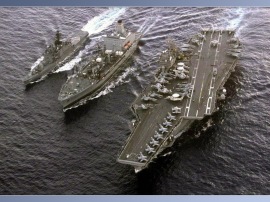Venezuela Holds American Ship for Arms Trafficking
September 7, 2012
FORBES | SEPTEMBER 7, 2012
The Venezuelan government has seized a U.S. flagged ship and detained its captain for more than a week.
Since August 29 the ship Ocean Atlas has been at port in Maracaibo, Venezuela, where it docked to unload a cargo of equipment. Yet after four hours in port, the ship was boarded and searched by armed security personel, and the captain was detained on suspicion of trafficking in arms or drugs. The captain has been identified as Jeffrey Michael Raider, 45, of Texas.
The rest of the crew of 15 Americans has remained on board under guard. According to a well-placed source arrest warrants have been issued for all of the crewmembers, who are to be taken off the ship for questioning.
Incredibly, my Forbes colleague Jeff Bercovici has been in touch over email with one of the crewmen, Russell Macomber, who has managed to post updates to his Facebook account while under detention.
In a sardonic tone, Macomber even relayed that when Venezuelan authorities raided the Ocean Atlas they stole cartons of cigarettes, ate the crew’s ice cream and let their dogs defecate on the deck. Macomber writes that he would like nothing more than an airdrop of Budweiser. (Read Jeff’s post and Macomber’s account here.)
Officials at the ship’s operator, Intermarine, did not immediately respond to Forbes’ requests for information. Nor did officials at American Maritime Officers, which is believed to have provided the crew for the ship. A spokeswoman at the Venezuelan embassy in Washington said she would look into the incident.
A spokesman for the Seafarers Union confirmed the seizure to Forbes and said, “The SIU is working feverishly to help resolve this situation and to ensure the safety of all mariners aboard the Ocean Atlas. We are staying in touch with the crew and will continue doing so.”
A U.S. Embassy official in Caracas also confirmed the incident to Reuters earlier today.
The seizure of the ship could become an international incident if not resolved soon. A month ago Venezuela detained a U.S. citizen entering from Colombia. President Hugo Chavez accused the man of being a mercenary and part of an “imperial” plot to oust him. So far there has been no public comment from Chavez about the Ocean Atlas detention.
The 12-year-old Ocean Atlas is one of a very small number of U.S.-flagged heavy-lift vessels. Its cranes can lift 400 tons and its giant holds are ideal for hauling hauls boats, generators, and oilfield equipment. It often moves cargoes under contract with the U.S. government or for projects financed by the U.S. Export-Import Bank, which requires U.S. flagged ships to carry any cargoes it has financed.
A decade ago the ship carried oilfield equipment to Iraq. And according to a backgrounder on Globalsecurity.org, it also made a special trip to Libya:
The Department of State requested that the vessel be quietly diverted to Libya, where under special security cover, the vessel was loaded in its entirety with equipment from Libya’s nuclear and other WMD programs arsenal. They included specialized centrifuges used in the processing of uranium to weapons grade, equipment from a uranium conversion facility, and Libya’s five SCUD-C long-range missiles. The cargo was discharged at an undisclosed U.S. East Coast port. The Libyan cargo move was truly a spur-of-the-moment operation.
The ship became the first U.S. vessel to dock in Libya in 20 years.
So was Ocean Atlas carrying weapons this time, on another top secret U.S. mission? No, says Macomber; nothing but three rifles in case they needed to ward off pirates.


